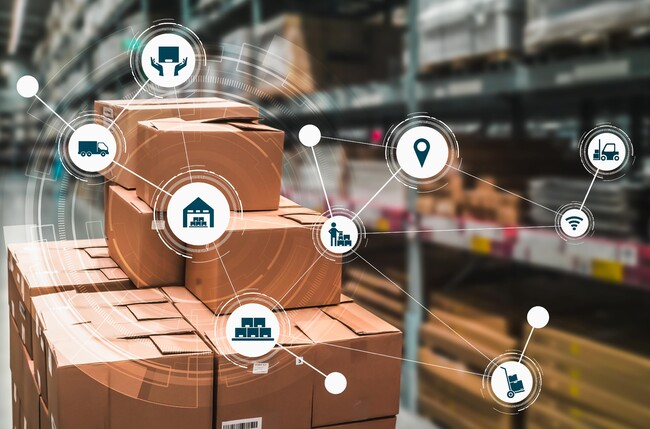ERP Software for Supply Chain Management: Things to Keep In Mind

With the constant rise of demand and competition in almost every industry, businesses are left with no choice but to look for new ways to maintain competitive advantage and increase profits. Some resort to improving their existing processes, while others look to implement more advanced and sophisticated systems, like ERP. It is proven to be effective for many sectors of a company, such as the supply chain. In this blog, we will explore what ERP software for supply chain management is, its role, and its benefits, as well as provide tips on how to choose an ERP system for your supply chain.
1. What is ERP for Supply Chain Management?
Before we get to the concept of supply chain ERP, let’s first define the concept of ERP. Enterprise Resource Planning, or ERP, is a comprehensive software system that allows businesses to manage their daily operations and business processes. It is a multi-product software solution that includes multiple modules. Depending on the type of ERP, such as custom or ready-made, these modules either come as pre-built or customized to fit the needs of a specific company. The most common modules are financial, inventory, CRM, procurement, manufacturing, warehouse, order and supply chain management.
Supply chain ERP is a type of software that helps businesses manage all supply chain activities while making the entire process more efficient and effective.
2. What Is the Role of ERP in Supply Chain Management?
ERP software for supply chain management acts like a central hub for all supply chain processes. It allows managers to coordinate various activities, such as planning, purchasing, and inventory management through a single system. In addition to the financials and other crucial data, ERP systems give businesses an overview of their supply chain operations since they store all business data in a single database.
It also enables businesses to better plan sourcing and production depending on consumer demand. It minimizes the difficulties and inconsistencies that generally result from integrating multiple apps to handle various supply chain functions. ERP systems also give businesses the ability to automate supply chain processes, which saves time and money while lowering the risk of human mistakes.

3. The Benefits of ERP for Supply Chain Management
ERP allows businesses to optimize crucial supply chain functions including demand planning, sourcing, production, and order administration. Here are the most common benefits companies can enjoy when using ERP for supply chain management:
Automation of work processes
Automation is becoming the norm in almost every industry, and the supply chain is not an exception. ERP systems streamline data exchange between and within departments, speeding up the supply chain and reducing manual involvement. For instance, if the inventory of important raw materials drops below set thresholds, the system can automatically warn purchasing groups.
Better efficiency throughout the entire supply chain
Through automation, supply chain ERP helps businesses streamline supply chain operations. By providing stakeholders with real-time visibility, supply chain ERP allows them to make informed decisions about cutting costs in manufacturing, logistics and procurement.
Better customer retention rates
ERP systems enable better planning, faster production schedules, and more precise delivery date projections by integrating supply chain data and procedures. These benefits aid companies in ensuring that they can keep their promises to clients which, in turn, increases client retention and loyalty.
Lower operational costs
Aligning demand and supply is what every supply chain manager strives to achieve, and supply chain ERP software can help with this. Improved supply and demand visibility allows businesses to manage their inventory more efficiently, saving money and freeing up much of warehouse space.
Streamlined workflow
Processes in the supply chain are interdependent. For instance, failure to stock raw materials on time results in a lack of inventory and production processes. With ERP systems, managers can identify potential bottlenecks, inform teams, and allocate the necessary resources to maintain production capacity and ensure on-time order delivery to customers.
Flexibility in decision-making
Volatility is an unavoidable aspect of the supply chain. Businesses are required to quickly adapt to the ever-existing changes in demand and supply. Rapid changes in supplier capacity, shipping lanes, and customer demand must be immediately detected by managers and addressed accordingly. ERP’s analytic tool allows managers to determine potential risks before they disrupt operations.

4. Factors to Consider When Choosing an ERP for Supply Chain Management
There are many ERP providers on the market, and choosing the right one may be a challenge. Here are a few factors to consider when shortlisting ERP software for the supply chain.
Avoid generic ERP solutions
No business is the same. Even though ready-made ERP systems are quite popular among businesses, there is no one-size-fits-all ERP solution. Accommodating fast and timely movement of raw materials and goods is critical in the supply chain, so consider this when choosing an ERP system for your supply chain business.
Consider compatibility
If your supply chain already relies on other systems, make sure the new ERP software for supply chain management can easily integrate with the existing systems. Despite all of the advantages of ERP for Supply Chain Management, you should be prepared to make considerable adjustments to your system, including setups, changes, and data transfer.
Consider the interface
Your employees will spend a lot of time using the new system, so you need to ensure it is user-friendly. Regardless of the interface, you might have to allocate some time to train your team to work with the new system.
Opt for scalability
ERP is the foundation of your supply chain, so you need to be sure the solution you choose can grow with your business. As your opportunities expand, you might need to add new features to your ERP system, so be sure to choose a solution that can seamlessly do so.
Choose a responsible vendor
With supply chain ERP, it’s not only about the software but also about the vendor. Be sure to choose a provider with experience in developing systems for the supply chain sector. Only software development companies in the related industry have the capability to provide you with a solution that works well for your business.
Conclusion
These days, automation and process optimization are the keys to success in any business. So companies that want to stay competitive in the industry should highly consider implementing new technologies like inventory management software, production management or a more comprehensive system like ERP. With ERP software, supply chain management becomes more efficient, and the long-term benefits are immeasurable.
FAQ:
What is ERP software?
ERP (or Enterprise Resource Planning) is a business management software that integrates all business processes into a single system, allowing managers to gain a 360-degree view and control over the entire organization. It is a comprehensive solution that covers all operational processes, including finances, manufacturing, inventory, order management, CRM, and more. With an ERP system, businesses can increase their profitability by optimizing their production process.
What is Supply Chain Management?
Supply chain management is a collective term for the activities involved in sourcing the raw materials to produce the goods and further distributing the finished goods to the consumer. It includes the entire process from delivering the raw materials to the manufacturing facility, goods manufacturing, inventory and delivery of the final product to retailers, consumers and other stakeholders.
A supply chain can sometimes be mixed up with logistics. However, supply chain vs. logistics are two different concepts and should never be confused with each other.
What can ERP do for my supply chain?
The role of ERP in the supply chain is critical as it helps the business to streamline its processes without impacting the quality of the product or the customer experience.
It provides 360-degree visibility and control of the entire supply chain process. ERP for supply chain management is also a powerful automation tool that helps reduce human errors and improve the speed and quality of the production process.
